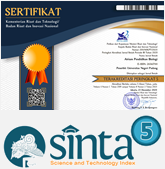Correlation of Basic Science Process Skills and Learning Outcomes of High and Low Level Students In Junior High School 35 Padang
Abstract
Science process skill is one of the important thing that students should have within natural science. Teacher must recognize their students’ process skills in providing learning. The purpose of this study to determine correlation between basic science process skill of grade 7th students in Junior High School 35 Padang and their cognitive domain. The sample set consisted of 136 students. This study focus to determine correlation of basic process science skills in 6 categories, there are: observed, prediction, measurement, classification, conclusion and communication with cognitive domain. Descriptive method used in this research with students’ worksheet based on basic science process skill as the instrument of measurement students’ science process skill and test as measurement cognitive domain. The correlation level between basic science process skill and cognitive domain shown by rs=0,43, it is indicate that basic science process skill have the positive and significant correlation with student’s cognitive domain. The correlation level between basic science process skills and cognitive domain of high level student shown by rs=0,43, this value indicate that basic science process skill have the positive and significant correlation with high level students’ cognitive domain. The last correlation between basic science process skill and cognitive domain of low level student with rs=0,21, it is indicate that basic science process skill have not significant correlation with low student’s cognitive domain.
Keywords
Full Text:
FullpaperReferences
Akinbobola, A.O. & F. Afolabi. (2010). Analysis of Science Process Skills in West African Senior Secondary School Certificate Physics Practical Examinations in Nigeria. American-Eurasian Journal of Scientific Reasearch, 5(4).
Aktamis, H. and O. Ergin. (2008). The Effect of Scicence Process Skills Education on Student’s Scientific Creativity, Scientific Attitudes and Academic Achievements. Asia-Pacific Forum on Science Learning and Teaching, 9 (1).
Ango, M. (2002). Matery of Science Provess Skill and Their Effective Use In The Teaching of Science: An Educology of Science Education in The Nigerian Context. International Journal of Educology, 16(1).
Arikunto, S. (2016). Dasar-dasar Evaluasi Pendidikan. Jakarta: Bumi Aksara.
Bloom, B.S. (1956). Taxonomy of Educational Objectives: The Classification of Educational Goals. Canada: David Mckay Company Inc.
Davis, B. and M. Summers (2014). Applying Daley’s Cone of Experience to Increase Learning and Retention: A Study of Student Learning in a Foundational Leadership Course. Qsciences Proceedings.
Dimyati dan Mudjiono. (2002). Belajar dan Pembelajaran. Jakarta: Rineka Cipta.
Feyzioglu, B. (2009). An Investigation of the Relationship between Science Process Skills with Efficient Laboratory Use and Science Achievement in Chemistry Education. Journal of Turkish Science Education, 6(3).
Huppert, J., Michal S. Lomask & R. Lazaroitz. (2002). Computer Simulations in the High School: Student’s Cognitive Stages, Science Process Skills and Academic Achievement in Microbiology. International Journal of Science Education, 24 (8).
Kratwohl, D.R. (2002). A Revision of Bloom’s Taxonomy: An Overview. Theory Into Practice. 41 (4).
OECD. (2016). PISA Result in Focus Retrieved from https://www.oecd.org. Diakses September 2018.
Ongowo, R.O. & Francis C. Indoshi. (2013). Science Process Skills in the Kenya Certificate of Secondary Education Biology Practical Examinations. Creative Education, 4(11).
Ozgelen, S. (2012). Student’s Science Process Skills within a Cognitive Domain Framework. Eurasia Journal of Mathematics, Science & Technology Education 8(4).
Sedana, I.N.A. (2016). Analisis Rekonstruksi Keterampilan Proses Sains Dalam Pembelajaran IPA Siswa Kelas IV dan V di Gugus XIII. E-Journal PGSD Universitas Pendidikan Ganesha, 4 (1).
Suryosubroto, D.B. (2002). Proses Belajar Mengajar di Sekolah. Jakarta: Rineka Cipta.
Zeidan, A.H., Majdi R. Jayosi. (2015). Science Process Skills an Attitudes toward Science among Palestinian Secondary School Students. World Journal of Education, 5(1).
DOI: http://dx.doi.org/10.24036/apb.v4i2.5854
DOI (Fullpaper): http://dx.doi.org/10.24036/apb.v4i2.5854.g3053




